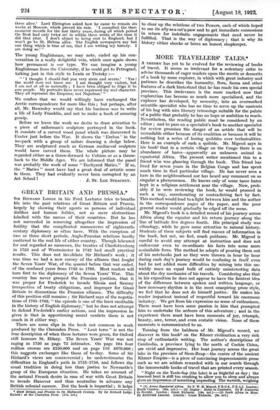GREAT BRITAIN AND PRUSSIA.*
Sin RICHARD LODGE in his Ford Lectures tries to breathe life into the past relations of Great Britain and Prussia, largely by showing their agents as persons of individual dislikes and human foibles, not as mere abstractions labelled with the names of their countries. But he has not succeeded in removing altogether the impression of futility that the complicated manoeuvres of eighteenthcentury diplomacy so often have. With the exception of two or three short periods, Anglo-Prussian relations hardly mattered to the real life of either country. Though laboured for and regarded as successes, the treaties of Charlottenburg in 1723 and of Westminster in 1742 had small practical results. This does not invalidate Sir Richard's work ; it was time we had a new survey of the alliance that fought the Seven Years' War, of the quarrel before that war ended, of the confused years from 1763 to 1793. Most readers will turn first to the diplomacy of the Seven Years' War. This country has never grasped the Prussian position, that it was proper for Frederick to invade Silesia and Saxony irrespective of treaty obligations, and improper for Great Britain to discontinue the Prussian alliance. The difficulty of this position still remains ; Sir Richard says of the negotiations of 1761-1762, " the episode is one of the least creditable in the history of English diplomacy," but he does not attempt to defend Frederick's earlier actions, and the impression he gives is that in apportioning moral verdicts there is not much in it either way.
There are some slips in the book not common in work produced by the Clarendon Press. " Lent term " is not the true description of when these lectures were given, for Oxford still honours St. Hilary. The Seven Years' War was not raging in 1750 as page 72 intimates. On page 104 four million crowns are £250,000 and on page 116 1670,000 ; this suggests exchanges like those of to-day. Some of Sir Richard's views are controversial ; he underestimates the difficulties in England's path in 1755-1750, and follows the usual tradition in doing less than justice to Newcastle's grasp of the European situation. He takes no account of the natural French desire in case of war with Great Britain to invade Hanover and thus neutralize in advance any British colonial success. But the book is impartial ; it helps to clear up the relations of two Powers, each of which hoped to use its ally as a cat'a-paw and to get immediate concessions in return for indefinite engagements that need never be fulfilled. That is the way of diplomacy ; that is why its history either shocks or bores an honest shopkeeper.


































 Previous page
Previous page